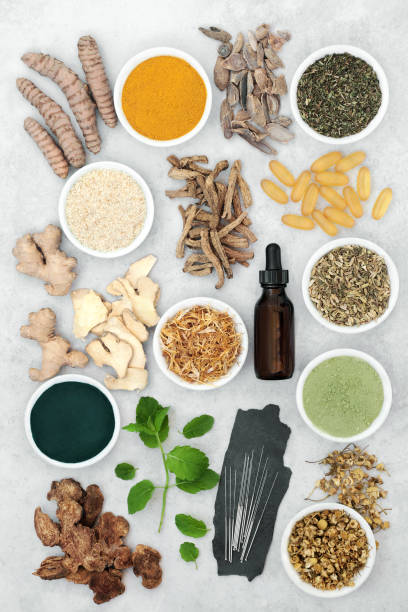IBS, or Irritable Bowel Syndrome, is a familiar and annoying stomach problem. Many people around us suffer from this issue. As a result, sufferers often endure it for a long time, consulting one doctor after another without relief, hoping to find a solution. Adding some herbs for irritable bowel syndrome into daily routines can be a natural way to ease symptoms.
Knowing more about its course makes dealing with the disease more manageable. Otherwise, impatience is typical.
In this article, we share what IBS is, its symptoms, ways to manage it, and some beneficial herbs for irritable bowel syndrome.
What is IBS?
It is a functional issue of our digestive system. There are no structural changes or problems in the digestive system.
This problem usually begins at a young age, with women suffering more. Those who are often anxious or stressed tend to suffer from it more.
Until now, the exact cause of IBS has not been understood well. However, there are some theories. Abnormal contractions and dilations of the digestive tract muscles, nerve signaling problems, anxiety and stress, changes in the natural and beneficial bacteria in the digestive system, etc., have been identified as reasons behind it.
However, extensive searches often find no significant problems in the digestive system.

Symptoms:
IBS is divided into two types: constipation-predominant and diarrhea-predominant. Its symptoms include:
❏ Abdominal pain that subsides after passing stool or gas.
❏ Bloating after eating anything.
❏ Diarrhea or loose stools.
❏ Constipation with hard or small stools.
❏ Passage of excess mucus with stools.
❏ Feeling unsatisfied after defecation.
❏ Pain on either side or in the middle of the lower abdomen, or general discomfort.
❏ Feeling relief in the stomach after bowel movements.
❏ Urgency to pass stool shortly after eating.
Additionally, symptoms such as abdominal fullness, excessive flatulence, indigestion, chronic fatigue, menstrual cramps, and body aches are common.
However, loss of appetite, nausea, vomiting, headache, sweating, insomnia, and bloody stools are not symptoms of IBS.
Ways to manage IBS:
- Avoid foods that trigger stomach problems, such as milk, dairy products, vegetables with excess oil, spicy foods, bakery products, artificial sugars, and caffeine.
- Incorporate regular exercise or walking to reduce stomach gas and bloating.
- Eat small portions throughout the day instead of large meals. Maintain a consistent meal schedule.
- Engage in exercise, yoga, or meditation to reduce stress. Seek expert advice if necessary.
Some rules you have to follow if you have IBS are:
In IBS, there is no specific diet plan. But you should notice which foods increase your problem and avoid them. If a patient has lactose intolerance or intolerance to milk, they should avoid dairy products.
Peppermint oil and coconut oil are very beneficial for IBS patients. They can consume 2 spoons of coconut oil daily on an empty stomach. It will relieve stomach pain.
Some foods that are beneficial for IBS patients are:
- Add fiber-rich foods to your diet plan. Fiber-rich foods are easily digested. Do not take too much fiber at a time. First, eat some, and day by day, you can eat more.
- Some people who have IBS cannot eat flour bread. They can eat rice bread instead of flour bread.
- Steamed and boiled foods are good for IBS patients.
- Eat more probiotics. Yogurt is a good source of probiotics. Practice consuming sour yogurt daily.
- Soak some fenugreek overnight in water and drink this water in the morning. It will help with IBS. You can also soak some cumin in water overnight and drink this water in the morning. It can help cure your IBS.
- Put some cardamom in your pocket and eat it several times. It also helps with IBS problems like vomiting and nausea.
- Drink gut-healthy juices like ash gourd juice, spirulina juice, and ABC juice.
- Trying to add fermented food to your diet. Because fermented foods are very beneficial for IBS sufferers.
Some foods that IBS patients should avoid are:
- Avoid dairy products. Most IBS patients face lactose intolerance with dairy milk. It can increase your IBS problem.
- Don’t eat stale food.
- Don’t drink too much tea or coffee.
- Avoid spicy and fried foods.
- Ultra-processed food can increase your IBS symptoms.
- Alcohol should be avoided.
Some IBS patients suffer from piles and anal fissure diseases. In these cases, blood may pass through the stool and there may be burning after stool. In this situation, you should see a rectal surgeon for better suggestions.

Herbs for Irritable Bowel Syndrome
Herbs can be a natural way to manage irritable bowel syndrome (IBS). Here are a few that improve gut health and IBS symptoms:
Peppermint: It’s the go-to herb for IBS. Peppermint oil capsules will relax your gut muscles and help with cramping, bloating and gas.
Fennel: Fennel seeds or tea will reduce bloating and gas. They will also calm an upset stomach.
Chamomile: This calming herb will relax your gut and help with diarrhea or cramping.
Ginger: Known for its anti-inflammatory properties, ginger can reduce nausea and support digestion.
Slippery Elm: Creates a soothing layer that covers the gut lining, easing irritation and discomfort.
Turmeric: Anti-inflammatory for IBS pain.
Aloe Vera: Aloe juice can help with constipation.
Licorice Root: DGL (deglycyrrhizinated) forms to soothe the digestive tract and reduce inflammation.
These will help, but you must determine what works for you. If you are unconfident, consult a healthcare provider before trying new remedies.
Read More Research and Resources About Beneficial Herbs for Irritatable Bowel Syndrome.
- Wikipedia
- Herbal Medicines for the Management of Irritable Bowel Syndrome
- News-Medical.net
- JAMA Network
- Western Herbal medicine and IBS
Living with IBS doesn’t have to control your life. By understanding the condition and adding these powerful herbs to your routine, you can take steps toward a more comfortable and healthier lifestyle.
We’d love to hear your thoughts—what’s worked for you in managing IBS? Comment below and share your experience!
Don’t forget to subscribe to our newsletter for more natural solutions for gut health. And if you enjoyed this post, share it with your friends to spread the knowledge!




